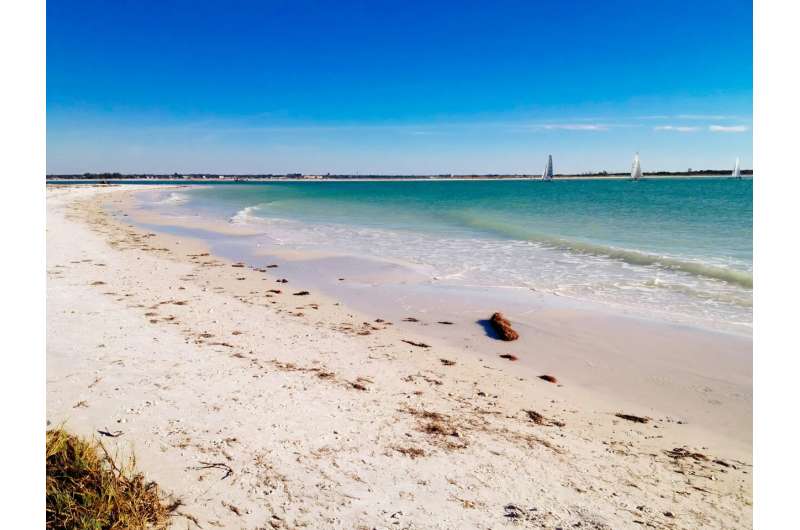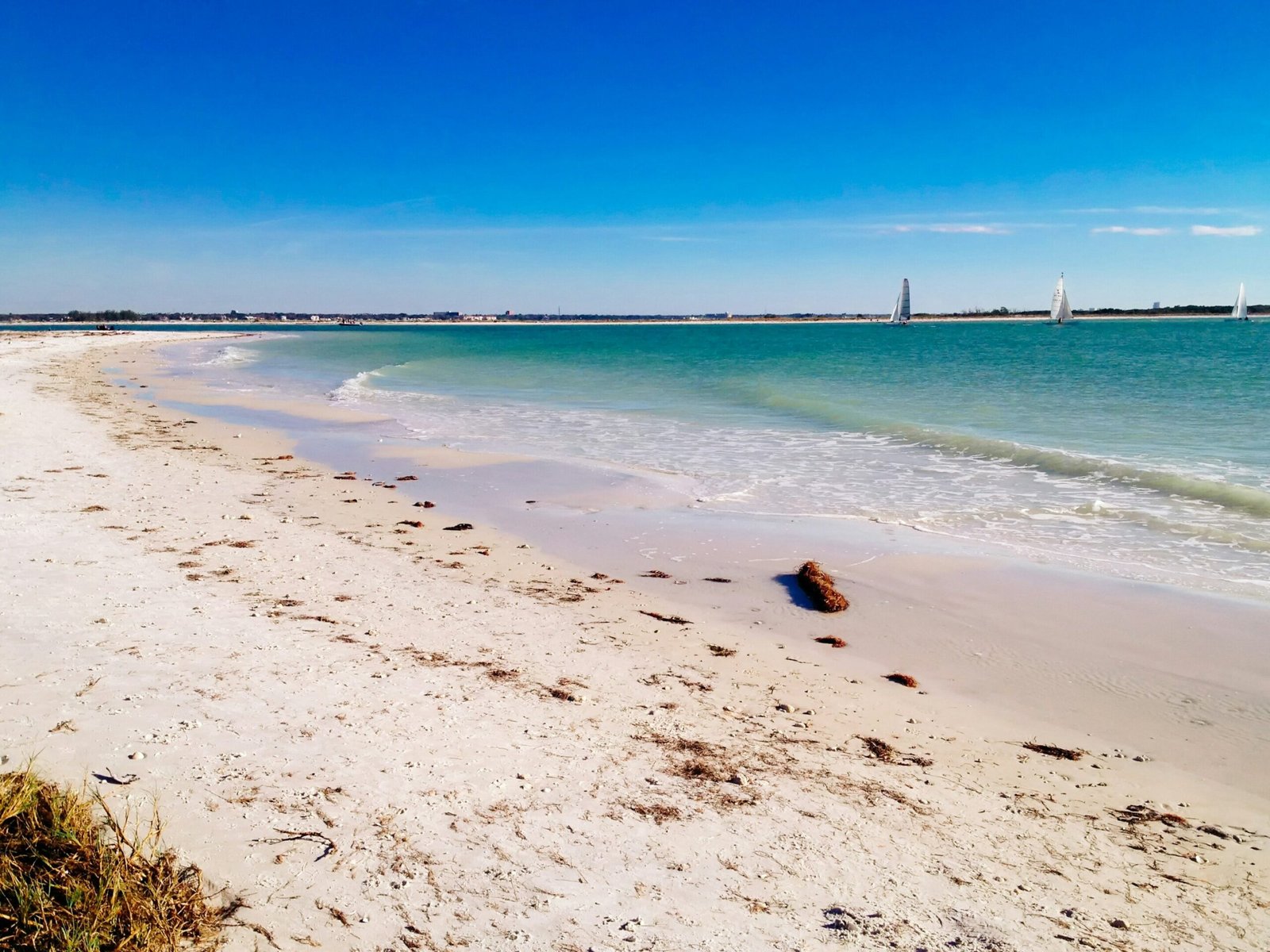
For Terry Fortner, the fight to save Honeymoon Island State Park from proposed development is personal. Nearly 130 years ago, just offshore from here, her grandmother Myrtle Scharrer was born in a pioneer home on Caladesi Island. She lived for decades in the tranquility of the then-untouched island chains that today include Florida’s most-visited state park. When she was pressured to sell her acreage in 1946, Scharrer placed on it a deed restriction that would lay the groundwork for its protection.
Now the state wants to put four pickleball courts at the park.
The proposal is part of a sweeping initiative from Gov. Ron DeSantis’ environmental agency that includes major changes at nine Florida state parks, including golf courses, two 350-room hotels and other “amenities” on protected lands from the Gulf to the Atlantic Ocean. The plan, first unveiled by the Tampa Bay Times last week, has caused swift and blistering pushback from across the political spectrum.
That’s why Fortner, granddaughter to a legendary Florida pioneer and herself a park defender, is here today: to defend “the real Florida.”
“We have so many needs for conservation of the resources already here, from paying the parks employees a living wage to supplying them with the working equipment they need,” Fortner said. “Adding pickleball courts increases the dependence of their time and limited resources that they have to oversee the liability of these courts’ usage and upkeep.”
Fortner wore a wide-brimmed sunhat and a flowing dress. As cars honked and their drivers whooped and hollered, she hoisted a poster that read “Honeymoon as intended, not by offended.”
About 100 others joined the protests just outside the entrance to Honeymoon Island State Park Sunday morning. It’s the second day in a row that protesters have gathered here, and it won’t be the last: Other events, including Tuesday plans where elected officials will gather to voice their concerns, are already gaining momentum.
Sunday’s gathering was one of several across the state where concerned citizens met at affected state parks to protest. Hundreds lined the streets Sunday near Anastasia State Park, where the state wants to build a 350-room hotel. Further south in Martin County, hundreds more gathered off U.S. Highway 1 to speak out against a golf course on Jonathan Dickinson State Park.
Chris Horton and his Catahoula pitbull, Waydoe, stood on the side of the Dunedin Causeway as the protest grew in numbers. Horton is a triple crown thru-hiker, meaning he’s trekked the three longest National Scenic Trails in the United States. Of the more than 10,000 miles he’s hiked over the past seven years, the views at Honeymoon Island are some of his favorites.
“It’s a paradise in our backyard that shouldn’t be tampered with,” Horton said. As cars whizzed by, he held up a “We love Honeymoon Island” sign.
The political pressure exerted on the Florida Department of Environmental Protection, which oversees state parks, has only intensified in recent days. Elected leaders from county commissioners to state legislators to Congress members have all strongly opposed the agency’s plans. Still, the environmental agency has only dug in its heels. An hour after it postponed a slate of near-simultaneous public meetings scheduled for Tuesday, the agency reiterated on social media its intent to build a golf course.
Legal challenges also appear to be mounting. In a letter to the Florida Department of Environmental Protection Saturday, the American Indian Movement of Florida, an Indigenous advocacy group, wrote that it intended to sue the state over apparent violations of federal Indigenous protections laws, including the Native American Graves Protection and Repatriation Act and the American Indian Religious Freedom Act.
Building a golf course on Jonathan Dickinson State Park land would destroy 35 known Indigenous burial and cultural sites within the park, the group wrote.
The American Indian Movement of Florida group said it would “use every means necessary to obstruct, delay, interfere, hinder, block, blockade and halt any effort by the Florida DEP to desecrate Indigenous cemeteries.”
Spokespeople for both the Florida Department of Environmental Protection and the governor’s office have not responded to requests for comment since Thursday.
On Saturday, the Tampa Bay Times revealed that a national veterans nonprofit pitched state and local officials on a similar proposal to build golf courses at Jonathan Dickinson State Park last year. Despite state senators and county commissioners rejecting the ideas, the nonprofit Folds of Honor may have brought its idea to state government.
The nonprofit’s founder, Lt. Col. Dan Rooney, had a one-on-one meeting with DeSantis on April 10, according to the governor’s schedule. The details surrounding that meeting remain unclear.
The Florida Department of Environmental Protection said Friday new public meeting dates would be announced soon, but they expected to hold them the week of Sept. 2, according to a social media post. Officials said they would find venues to fit what was likely to be thousands of concerned attendees.
Joanna Burchfield’s 5-year-old son, Jacoby, looked out the window as her family of four drove out to Honeymoon Island State Park Sunday to protest.
Wearing a tie-dyed “future environmentalist” T-shirt, Jacoby watched as the towering condos outside flew past.
“All I can see is stuff that people made,” he told his mom. “There’s not enough trees, and too many concrete buildings.”
2024 Tampa Bay Times. Distributed by Tribune Content Agency, LLC.
Citation:
At Honeymoon Island State Park, urgency grows to defend ‘the real Florida’ (2024, August 26)
retrieved 26 August 2024
from https://phys.org/news/2024-08-honeymoon-island-state-urgency-defend.html
This document is subject to copyright. Apart from any fair dealing for the purpose of private study or research, no
part may be reproduced without the written permission. The content is provided for information purposes only.
